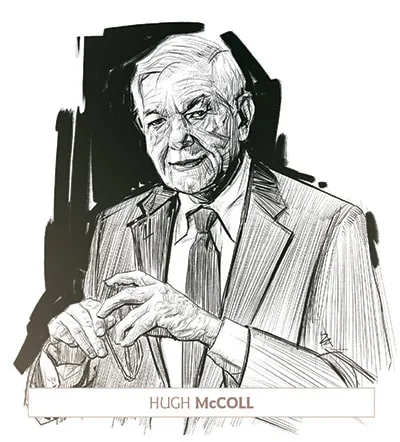
By Audrey Knaack and David Mildenberg
Within a couple of years, Charlotte’s most prominent intersection is likely to sport a tribute to Charlotte banker Hugh McColl Jr. It will be on one-third-acre park across Trade and Tryon streets from the two towers where he served for 18 years as CEO for NCNB, NationsBank Bank of America.
The park’s design is a work in progress, backed by $10 million raised from local individuals and groups. It’s unclear if it will become a glitzy attraction or a tranquil site.
What’s certain is that it replaces Thomas Polk Park, which opened in 1991 and was demolished several weeks ago. The park featured a large waterfall and a tribute to the Revolutionary War-era man most associated with Charlotte’s founding.
Earlier this year, the City Council approved its the demolition, noting the park was in disrepair amid a center city that has suffered since the pandemic with more homeless people, vacant office and retail space and growing crime fears. A city press release called Polk Park “obsolete, with limited gathering space, poor lighting, outdated landscaping, and a hard-to-maintain fountain.”
The changing park demonstrates Charlotte’s business-first approach to development, which prioritizes the recent over the past. In this case, that’s fine with Dan Morrill, the retired UNC Charlotte professor and the city’s best-known preservationist. “History is about today. I have no problem with them renaming the park,” Morrill says.
Morrill says he never liked Polk Park’s design, despite his great esteem for Polk’s historic importance. The waterfall was too big for the small parcel, and it was dominated by blank walls of two adjoining towers, he says. “One of those buildings needed to have an opening so you could walk through the park,” says Morrill. “It just didn’t work.”
Other historians disagree. Charles Birnbaum, CEO of the Washingon, D.C.-based Cultural Landscape Foundation, protested the change to city officials with no apparent impact.
“Polk Park was a rare and important public work in Charlotte by a woman artist (Bulgarian-born landscape architect Angela Danadjieva). The city did a poor job of maintaining Polk Park,” he says. “Even worse was the absence of an honest public review process.”
Honoring McColl is an easy decision in Charlotte, of course. The City Council approved spending $350,000 to level the park knowing that Charlotte City Centers Partners CEO Michael Smith was raising $10 million for the new iteration. That fundraising “is going extremely well. I can’t say more than that,” says Moira Quinn, the partnership’s spokesperson.
Last week, Smith organized a community meeting to introduce the team that will design the park and take initial input. Civil engineers Bolton & Menk, which bought Charlotte’s ColeJenest & Stone firm in 2021, and Charlotte native Walter Hood, a landscape architecture professor at the University of California, Berkeley, will oversee the project. Hood’s past projects include a garden at the International African American Museum in Charleston, S.C., and the Peter Oliver Gallery Memorial in Winston-Salem.
“We believe that community input is crucial in creating an inspired public space that responds to the aspirations of our residents,” Smith said in a release after the Sept. 21 meeting.
Listening to the community isn’t how Sarah Hardinger, president of the Mecklenburg Historical Association, describes the matter. She says local history buffs had no input before Polk Park was eliminated and blames the city for not maintaining the park and allowing homeless people to gather there frequently. Smith and others had been working on the project without public input since 2021, she notes. Her preference would be to refurbish the park to its original status.
“We’re losing an architectural treasure that is probably the only park truly designed by a woman in Charlotte history,” she says. “In my 30 years in Charlotte, I don’t recall them tearing down a public site like this without any public input. There was no time to seek concessions because it only came out in the news when the city agreed to destroy the park rather than repair it.”
The McColl Park Committee includes civic leaders Kieth Cockrell, Harvey Gantt, Michael Marsicano and Cindy Patterson. While the city owns the land, the committee will make the design decisions with input from Assistant City Manager Phil Reiger, Quinn says.
Morrill says it’s smart to honor McColl, who he deems as the second-most important figure in Charlotte history behind industrialist D.A. Tompkins, who pioneered the region’s textile industry in the late 19th century. McColl was among the nation’s most powerful bankers during his career, while helping lead many civic initiatives with a small group of other Charlotte CEOs. He was the dominant force in developing Charlotte’s central business district into national prominence.
Morrill hopes the new park will include a nod to Polk, whose detachment helped protect the Liberty Bell in Philadelphia during the Revolutionary War.

